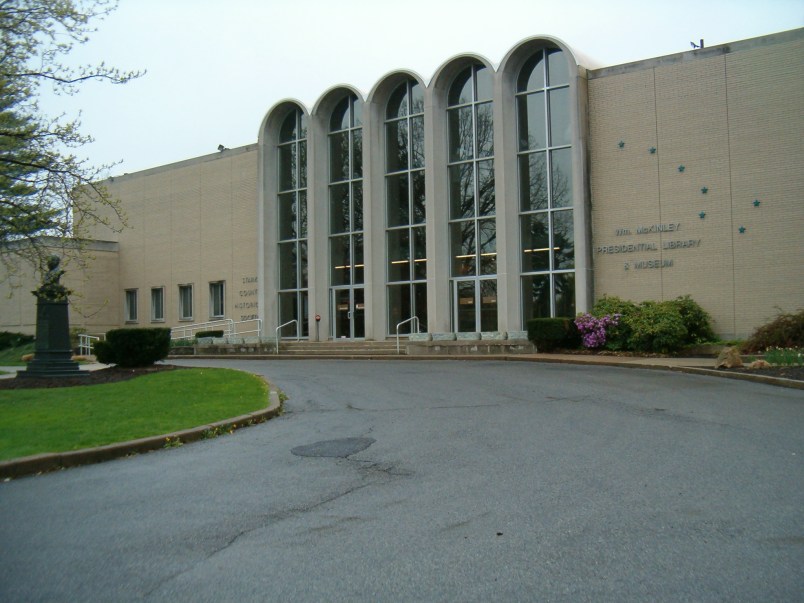The curator for the McKinley presidential library told TPM on Monday that she’s not upset President Obama has stripped his predecessor’s name from North America’s tallest mountain. Instead, she’s just glad people are finally talking about the library’s namesake.
“We’re happy for the people of Alaska who have wanted to rename this mountain for nearly 40 years, but we are sad that our president will no longer be on the name of the mountain,” curator Kimberly Kenney said by phone from the McKinley Library & Museum in Canton, Ohio.
“But we’re really excited that people are talking about McKinley on a national scale because that doesn’t happen too often anymore,” she said. “He’s been gone over 100 years.”
McKinley, an Ohio native who was assassinated six months into his second-term, is often forgotten because of President Teddy Roosevelt’s “larger-than-life” presidency, which followed McKinley’s.
When asked by TPM about McKinley’s lasting legacy, Kenney cited his role as commander-in-chief during the Spanish-American War, which she said, was the first time the U.S. went to war on foreign soil.
“That was a fundamental shift in our foreign policy,” Kenney told TPM. “The United States became a global power with that war and it set the precedent for foreign policy into the 20th century and the 21st century. No one really realizes that or talks about that.”
Ohio Gov. John Kasich, US Rep. Bob Gibbs (R-OH) and House Speaker John Boehner (R-OH) all voiced some sort of disappointment with President Obama’s announcement to revert North America’s highest peak to its Alaska Native name, Denali.
Photo provided by McKinley Presidential Library & Museum, which is pictured above.







No mimed disappointment?
¨When asked by TPM about McKinley’s lasting legacy, Kenney cited his role as commander-in-chief during the Spanish-American War, which she said, was the first time the U.S. went to war on foreign soil.
“That was a fundamental shift in our foreign policy,” Kenney told TPM. "The United States became a global power with that war and it set the precedent for foreign policy into the 20th century and the 21st century. No one really realizes that or talks about that.¨¨
Yeah, we became a world-class imperialist nation under McKinley. For which we should be ashamed, not proud.
As Mark Twain wrote toward the end of McKinley’s first term:
I left these shores, at Vancouver, a red-hot imperialist. I wanted the American eagle to go screaming into the Pacific. It seemed tiresome and tame for it to content itself with he Rockies. Why not spread its wings over the Phillippines, I asked myself? And I thought it would be a real good thing to do
I said to myself, here are a people who have suffered for three centuries. We can make them as free as ourselves, give them a government and country of their own, put a miniature of the American constitution afloat in the Pacific, start a brand new republic to take its place among the free nations of the world. It seemed to me a great task to which had addressed ourselves.
But I have thought some more, since then, and I have read carefully the treaty of Paris, and I have seen that we do not intend to free, but to subjugate the people of the Phillippines. We have gone there to conquer, not to redeem. . .
It should, it seems to me, be our pleasure and duty to make those people free, and let them deal with their own domestic questions in their own way. And so I am an anti-imperialist. I am opposed to having the eagle put its talons on any other land.
I always assumed the McKinley Presidential Library would be, like, in a small Craftsman.
Forgive her. She has a lonely job.
The librarian sounds pretty level-headed to me.
And the Ohio Republican delegation had an issue with something Obama did? Did they wait to hear what happened before voicing their displeasure, or after?